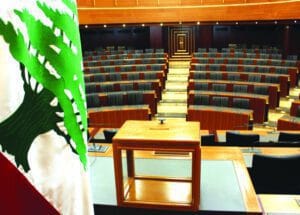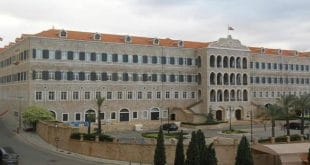**مورفين: استمرار المؤسسات في مواجهة الفراغات**
تتعمق تأثيرات الحرب يومًا بعد يوم، مما يزيد من تعقيد الأزمات اللبنانية ويفاقم غياب الحلول والدولة. وكان آخر فصول هذه الأزمة في المجالين البرلماني والقضائي، مع اقتراب استحقاقات دستورية وانتخابية وتعيينات يتعذر على أي من السلطات إنجازها، فيما تستمر المعارك في الشريط الحدودي، ويتسع نطاق القصف ليشمل بيروت وجنوبها والبقاع، وصولاً إلى جبل لبنان وزغرتا ومخيمات قرب طرابلس.
الغياب الواضح لمجلس النواب اللبناني يتعاظم، ليس فقط بسبب عدم قدرته على انتخاب رئيس للجمهورية أو تشكيل حكومة جديدة كاملة السلطات، بل أيضًا لفشله في القيام بواجباته التشريعية لمواكبة الظروف الاستثنائية. أمام المجلس استحقاقان دستوريان لا يمكن تجاهلهما: الأول هو إقرار الموازنة العامة لعام 2025، والثاني هو انتخاب أعضاء مكتب المجلس واللجان النيابية.
**إحالة الموازنة ضمن المهلة الدستورية**
للعام الثاني على التوالي، قامت الحكومة بإرسال الموازنة العامة ضمن المهلة المحددة دستوريًا (المادة 839)، حيث أقر مجلس الوزراء مشروع الموازنة في 23 أيلول 2024، وأحاله إلى مجلس النواب في 4 تشرين الأول 2024. إذا تسلم مجلس النواب الموازنة كما هو متوقع، سيبدأ بدراستها في لجنة المال والموازنة تمهيدًا لعرضها على الهيئة العامة، لكن حضور نواب كتلة “الوفاء للمقاومة” قد يشكل تحديًا كبيرًا.
إذا لم يتم إقرار الموازنة في الموعد المحدد، يمكن للسلطة التنفيذية إصدارها بمرسوم وفق المادة 86 من الدستور، وهو إجراء ضروري في ظل الأوضاع الحالية لضمان وجود موازنة تسهل إنفاق الدولة على الدفاع وتعزيز المؤسسات.
**انتخابات مكتب المجلس واللجان**
تنص الفقرة الثانية من المادة 44 من الدستور على ضرورة انتخاب أمينين للسر في بداية عقد تشرين الأول من كل عام، فضلاً عن انتخاب ثلاثة مفوضين في الجلسة ذاتها. يتعين على مجلس النواب أيضًا انتخاب لجانه الدائمة عند افتتاح العقد. في 22 تشرين الأول 2024، سيكون المجلس ملزمًا بالاجتماع لإجراء هذه الانتخابات، لكن ماذا لو تعذّر عقد الجلسة بسبب الوضع الأمني؟
تاريخيًا، واجه المجلس مشكلة مشابهة خلال الحرب الأهلية في عام 1978، حيث اعتمد على استشارة قانونية أكدت أن الظروف الاستثنائية تتيح استمرار عمل اللجان ومكتب المجلس حتى انعقاد الجلسة المقبلة. إذا تعذر الاجتماع في الموعد المحدد، يمكن تطبيق قاعدة “استمرارية المؤسسات”، مما يعني استمرار اللجان النيابية وأعضاء مكتب المجلس في مهامهم حتى انعقاد الجلسة التالية. لكن يجب التنبيه إلى أن هذه الاستمرارية لا تعني التمديد تلقائيًا لسنة كاملة كما حدث عام 2019، بل حتى زوال الظروف الاستثنائية.
**تمديد مرتقب في القضاء**
قدّم النائب علي حسن خليل اقتراح قانون مستعجل لتعديل المادة 2 من المرسوم الاشتراعي الرقم 150 الصادر عام 1983، يسمح لأعضاء مجلس القضاء الأعلى المنتهية ولايتهم بالاستمرار في ممارسة مهامهم حتى تعيين بدلاء، باستثناء الحالات التي يبلغ فيها الأعضاء السن القانونية. حاليًا، يوجد 6 أعضاء فقط من أصل 10، بعد شغور منصبَي المدّعي العام التمييزي ورئيس هيئة التفتيش القضائي، بالإضافة إلى عدم القدرة على انتخاب أعضاء جدد بسبب غياب رؤساء غرف أصيلين في محكمة التمييز.
لذا، يرى خليل أن هذا التعديل ضروري لضمان انعقاد مجلس القضاء الأعلى بنصاب قانوني، لأنه المسؤول عن ضمان سير العدالة. يبدو أن الفراغ في مجلس القضاء الأعلى خطر، خاصة أن ولاية الأعضاء انتهت بالفعل (في 14 تشرين الأول). لكن يمكن للحكومة – على الرغم من كونها حكومة تصريف أعمال – تعيين أعضاء جدد من دون الحاجة إلى قانون في مجلس النواب، لكن هذا الملف لا يُطرح بسبب الخوف من النزاعات السياسية حول الحصص القضائية.
إن غياب مجلس القضاء الأعلى يعود إلى القضية الكبرى: انفجار مرفأ بيروت، التي جعلت الأطراف المشاركة في الحكومة تسعى لتعطيل هذا الملف عبر طعون متعددة. هناك أيضًا فراغات أخرى في هيئات قضائية مثل هيئة التفتيش القضائي، ومكتب مجلس شورى الدولة، ومعهد الدروس القضائية، مما ينذر بشلل هائل في القضاء قد يؤخر البت في عشرات الملفات والأحكام المستحقة.
المصدر: شربل البيسري – الجمهورية
**Morphine: The Continuation of Institutions Amidst Vacuums**
The impacts of the war intensify day by day, further complicating the Lebanese crises and exacerbating the absence of solutions and state presence. The latest chapters of this crisis unfold in parliamentary and judicial realms, with impending constitutional and electoral deadlines that none of the authorities can fulfill, as battles continue along the border, and bombardments expand to include Beirut, the south, Baalbek, and even Mount Lebanon, Zgharta, and camps near Tripoli.
The notable absence of the Lebanese Parliament is growing, not only due to its inability to elect a president or form a fully empowered government but also because of its failure to carry out its legislative and political duties in light of the exceptional circumstances the country is experiencing. The Parliament is faced with two constitutional deadlines that it cannot ignore: first, the approval of the 2025 budget, and second, the election of members for the council's office and parliamentary committees.
**Submission of the Budget Within the Constitutional Deadline**
For the second consecutive year, the government submitted the general budget within the constitutionally specified deadline (Article 839). The Cabinet approved the draft budget on September 23, 2024, and referred it to the Parliament on October 4, 2024. If the Parliament receives the budget as expected, it will begin discussing it in the Finance and Budget Committee before presenting it to the general assembly. However, this poses a significant challenge due to the difficulty of having members of the “Loyalty to the Resistance” bloc present for the sessions.
Should the budget not be approved by the set deadline, the executive authority may issue it by decree according to Article 86 of the Constitution, which is a necessary step given the current conditions that require a budget enabling the state to spend on community defense and institutional strengthening.
**Elections for the Council's Office and Committees**
The second paragraph of Article 44 of the Constitution mandates the election of two secretaries at the beginning of October each year, as well as the election of three commissioners in the same session. Additionally, the Parliament must elect its permanent committees when the session opens. On October 22, 2024, the council is obligated to meet to conduct these elections. However, what if the session cannot be held due to security issues?
Historically, the council faced a similar problem during the Civil War in 1978, relying on legal consultation that confirmed exceptional circumstances allow the continuation of committee and council office operations until the next session. If the council cannot meet as scheduled, the principle of “continuity of institutions” may apply, meaning the parliamentary committees and council office members would continue their duties until the next session convenes. It is important to note that this continuity does not automatically mean a one-year extension as occurred in 2019, but only until the exceptional circumstances subside.
**Expected Extension in the Judiciary**
Last week, MP Ali Hassan Khalil presented an urgent bill to amend Article 2 of Legislative Decree No. 150 of 1983, allowing members of the Supreme Judicial Council whose terms have expired to continue their duties until replacements are appointed, except in cases where members reach legal retirement age. Currently, there are only six members out of ten, following the vacancy of the positions of the Public Prosecutor and the Head of the Judicial Inspection Authority, in addition to the inability to elect new members due to the absence of permanent chamber presidents in the Court of Cassation.
Therefore, Khalil believes this amendment is essential to ensure the Supreme Judicial Council can meet quorum, as it is responsible for ensuring the smooth operation of justice. There is no doubt that the vacancy in the Supreme Judicial Council poses a danger, especially since the members' terms ended (on October 14) before discussing the proposal. However, another solution, politically difficult to realize, is that the government – despite being a caretaker government – can appoint new members without needing a law from the Parliament. However, this issue has not been brought to the Cabinet table due to fears of significant political disagreements regarding judicial shares.
The vacancy in the Supreme Judicial Council is tied to the major issue of the Beirut Port explosion, which prompted governmental parties to seek to stall this file through various appeals. Additionally, there are other vacancies affecting judicial bodies like the Judicial Inspection Authority, the Council of State's Office, and the Institute of Judicial Studies, alongside the disruption in appointing new judges. Consequently, this warns of an impending massive paralysis in the judiciary that could hinder hundreds of cases and delay the adjudication of dozens, if not hundreds, of pending rulings.
translated by economyscopes team
 سكوبات عالمية إقتصادية – EconomyScopes إجعل موقعنا خيارك ومصدرك الأنسب للأخبار الإقتصادية المحلية والعربية والعالمية على أنواعها بالإضافة الى نشر مجموعة لا بأس بها من فرص العمل في لبنان والشرق الأوسط والعالم
سكوبات عالمية إقتصادية – EconomyScopes إجعل موقعنا خيارك ومصدرك الأنسب للأخبار الإقتصادية المحلية والعربية والعالمية على أنواعها بالإضافة الى نشر مجموعة لا بأس بها من فرص العمل في لبنان والشرق الأوسط والعالم




